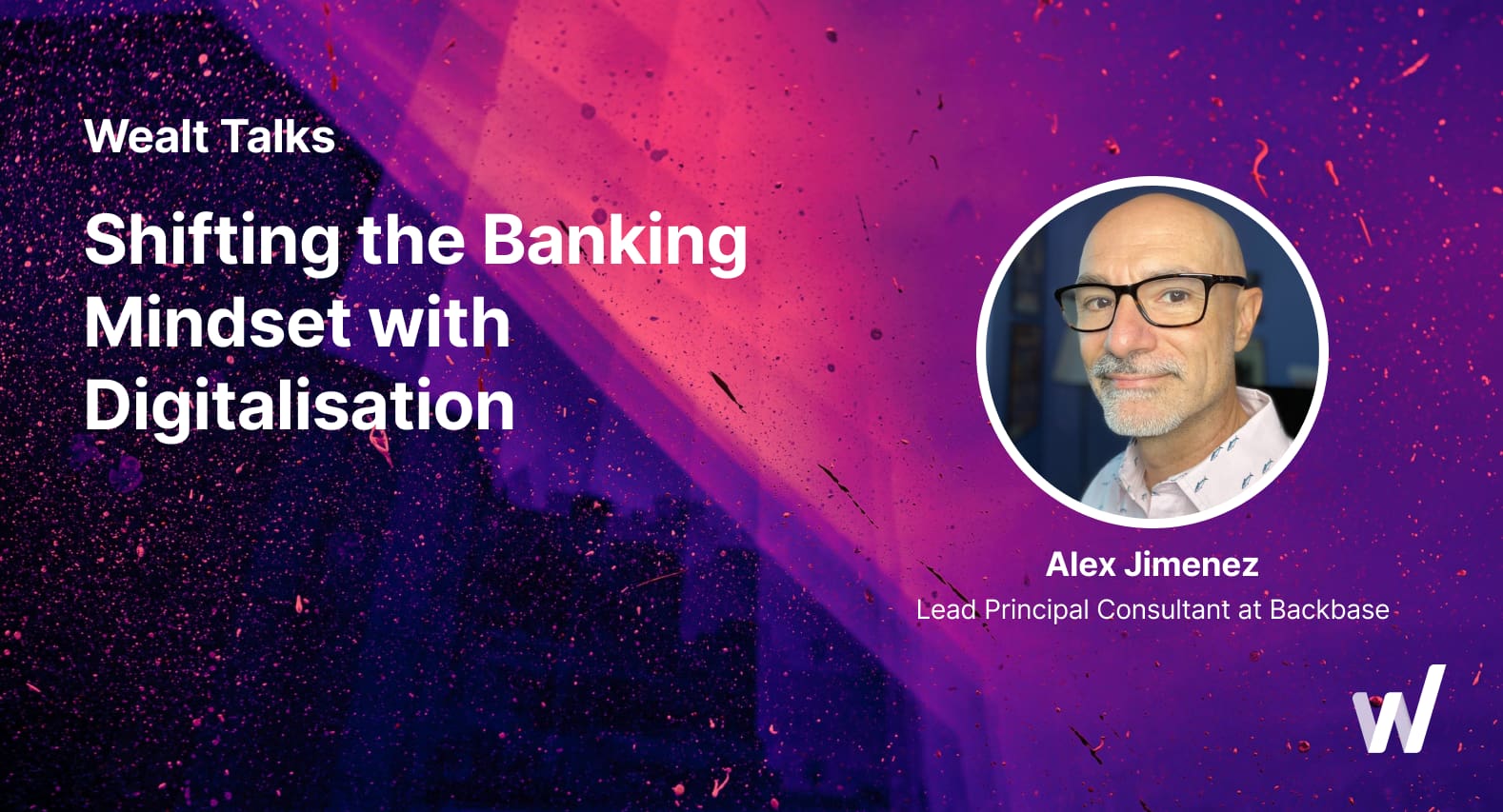Alex Jimenez on Shifting the Banking Mindset with Digitalisation
Explore how digitalisation is redefining banking strategy, the role of AI, and how banks must transform to meet modern customer needs.

Welcome to the newest episode of Wealt Talks, where we discuss financial technology and its impact on the industry. This week, we are talking with Alex Jimenez about digital transformation, digital banking, and the evolution of fintech. Grab your favourite tea and prepare yourself for this exciting Wealt Talks episode.
TL;DR
- Bank executives’ thinking is finally evolving; digital capabilities are no longer seen as alternatives or added channels but as the new way banking is done today and in the future—a new perspective.
- Banks have difficulty implementing AI in customer service, and customer service bots are less powerful than platforms such as AI ChatGPT.
- Banks are moving away from merely adjusting and incrementally making process changes and are finally redesigning how to meet their clients’ needs. This will ultimately produce and boost better services.
- Innovation continues to face many obstacles. North American banks and regulators cannot effectively collaborate to move the industry forward, complicating the integration of new fintech innovations.
- Effective digital transformation requires a holistic approach, emphasising leadership involvement, strategic planning, and preemptive compliance measures.
Meet our guest
Alex Jimenez - Lead Principal Consultant at Backbase
Alex has over 28 years of experience in banking in various roles, including strategic planning, payments, digital banking, operations, program and project management, business process improvement, marketing, and voice of the customer. He has been included in several influencer lists and regularly speaks at major industry events.
Evolution of strategic priorities to digitalisation
Alex began our conversation, noting that banks have taken too long to realise that the industry is in the middle of a business transformation, not just the emergence of new technology. Lately, priorities have fundamentally shifted with customers' emergence and adoption of digitalisation and fintech. The evolution of digitalisation is affecting strategic priorities. Initially, digitalisation was regarded as just another distribution channel, but now, it has been recognised as a critical set of tools affecting the whole enterprise. It redefines all aspects of banking, ranging from customers accessing accounts via digital platforms to communicating with bank personnel through different contact points.
.png)
Based on his experience, Alex discussed that digital capabilities had been treated as side activities; instead, they should play a part in overall strategic planning. This view has shifted dramatically in recent years. Digital technology is no longer just a nice-to-have but a crucial component of the strategic frameworks of any smart financial institution. The evolution from treating digital as a minor component to embracing it as a strategic imperative signifies a major cultural and operational shift for banks. The industry, which had initially trailed other sectors in embracing digital, is now moving faster and innovating. Those organisations that lag will get lost even further. Alex asserts that digital transformation is not just using new tools but a change of core processes and overall approach to customers. Banks now have to be more than their traditional services. They must become agile, responsive and proactive in leveraging digital innovation to enhance their services.
Are banks ready for AI adaptation?
Recently, access to generative AI tools has raised awareness throughout the industry about what is possible using AI. In banking, predictive analytics algorithms are widely used for risk management, accelerating loan approvals and enhancing fraud management. However, newer AI capabilities promise customers highly personalised, contextual, and real-time financial advice, which remains largely on the horizon.
.png)
While the excitement around generative AI has sparked a heightened interest, Alex points out a crucial gap: many banks need to prepare for this leap. The main obstacle is not the lack of AI tools but rather the banks' readiness in terms of data management. Current AI chatbot implementations, such as Bank of America’s Erica and Chase’s Digital Assistant, do not yet offer anything that can come close to advanced AI systems like ChatGPT. There is big room for change and new development in how AI is used to support customers.
Banks should focus on advanced capabilities that can address known customers’ needs instead of looking at emerging technologies, like the metaverse, only looking for a problem. Another concern is the latest trend for some organisations to focus only on cost-cutting while putting innovation on hold. Appropriate transformation should have included cost optimisation as one of its goals, along with reimagining customer experiences.
.png)
This strategic shift is expected to widen the gap between digitally proficient organisations and those that merely adopt new technologies superficially. As this disparity continues, the number of mergers and acquisitions in the banking sector will rise drastically to the point where more organisations will start reaching regulator caps that the largest four US banks have reached. Moreover, in the fintech sector, firms will likely extend their offerings, moving away from a single focus on one experience. Such advances will inevitably improve the banking service for banking clients, enhancing experiences, products, services, and personalised interactions powered by sophisticated AI and other digital capabilities.
Key challenges and strategies in banking sectors
Alex talked about how digital transformation in banking can be done effectively. To succeed, executives should shift their strategy from focusing on delivery channels or products to customer-experience-based models focusing on customer experiences and journeys. He proposes substituting the conventional-based strategic planning and budgeting processes by implementing dynamic, continuous, and agile approaches that smoothly handle the ever-changing nature of digital technologies. In addition, Alex advises banks to pick platforms with integrated wide capabilities instead of individual point solutions. He asserts that the whole management team should approach proper digital transformation rather than a singular project for the technology team. The process must be based on a well-crafted strategic plan and a customer-centered vision.
Regarding regulation, Alex says that while a growing number of banks are deploying new digital capabilities and partnering with fintech firms, North American regulators lag the industry, causing complications for innovation. A lack of understanding about the benefits and risks of new technologies often results in establishing regulations that hamper innovation. There is another part of the story. Some organisations have seen certain new ideas, such as banking as a service (BaaS). Instead of approaching them with a balanced view, weighing benefits and risks, they only understood it as a new source of revenue generation. Such approaches give regulators more fodder for regulatory action, delaying industry innovation. Alex highlighted the need to include compliance teams from the start of the transformation process and openly discuss how risks should be managed, even when regulators have yet to address a new idea, such as BaaS.
.png)
There is a concern about the governance of such technologies as AI, saying that there is a need for sufficient regulations to enable adequate compliance. He opines that banks should plan for all the rules and regulations with artificial intelligence governance upfront before incorporating them into their strategy to avoid unintended loopholes. Banks can smoothly overcome the intricacy of digital change by evaluating strategic and customer-focused strategies and being proactive in regulatory commitments, with this impact partly being reinforced by the level to which service delivery and customer satisfaction increase.
Enjoyed our chat? Follow Wealt on LinkedIn to get notified about new episodes. And make sure to follow Derin and say hi to be a guest at Wealt talks.
Subsribe to our weekly newsletter
Get our Sunday morning newsletter with exclusive deals, portfolio updates, and private market insights delivered straight to your inbox.



.jpg)
